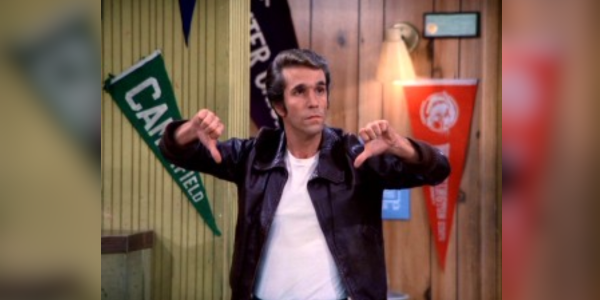Growing up, one of my favorite shows was Happy Days. It was set in the 1950s and revolved around the life of Richie Cunningham, a clean-cut, well-meaning teenager trying to navigate the ups and downs of adolescence. But let’s be honest—the real star of the show, and the reason so many people tuned in, was Arthur Fonzarelli, better known as The Fonz.
Fonzie was the ultimate underdog. He wasn’t rich, didn’t come from an influential family, and had no formal education beyond high school. But he had something else—confidence, resilience, and an undeniable cool factor. He wasn’t just a leather-jacket-wearing tough guy; he was someone who looked out for the little guy, stood up for his friends, and refused to let circumstances define his future.
And yet, despite his natural charisma and street smarts, he often found himself at odds with authority figures—teachers, parents, and business owners who saw him as reckless, irresponsible, or simply not fitting into the mold of “success.” But that’s precisely why we loved him. Fonzie was more than a rebel—he was a reminder that leadership isn’t about titles or pedigree. It’s about character, loyalty, and a willingness to stand up for what’s right.
Why Do We Love Underdogs?
From Happy Days to Rocky, Rudy, and even classic literature like The Grapes of Wrath, underdog stories have always captured our hearts. But why?
Psychologists suggest that underdog stories resonate with us because they tap into our sense of fairness. We want to believe that hard work, resilience, and heart matter more than privilege or status. Underdogs remind us that the system isn’t always fair, but that people who refuse to quit—who fight despite the odds—can still succeed.
More importantly, underdogs bring out our best instincts. We admire them because they embody the qualities we all wish we had more of: courage, adaptability, and grit.
What This Means for Leadership
In leadership and management, it’s easy to fall into the role of the rigid authority figure—the ones who doubted Fonzie, dismissed his potential, and expected Richie and his friends to “stay in line.”
Great leaders, however, recognize the power of the underdog. They know that:
- Talent isn’t always obvious at first. Fonzie might not have had the resume of a traditional leader, but he had wisdom, loyalty, and the ability to inspire. The same is true in business—some of the best employees may not fit the conventional mold, but they bring unique strengths that shouldn’t be ignored.
- Rules should serve people, not control them. Many workplaces become overly rigid, focusing on policies instead of people. But when leaders enforce rules for the sake of control rather than impact, they stifle innovation and morale.
- People rally around fairness. When employees see a leader championing those who are often overlooked, they become more engaged. No one wants to work in an environment where only the privileged succeed.
How to Lead Like an Underdog Champion
If you want to lead in a way that inspires rather than controls, consider these shifts:
- Look beyond traditional markers of success. Just because someone doesn’t fit the standard mold doesn’t mean they lack potential. Pay attention to skills like resilience, creativity, and the ability to build relationships.
- Encourage risk-taking. Underdogs don’t win by playing it safe. Create an environment where people feel comfortable trying new things—even if they fail.
- Challenge the status quo. Fonzie didn’t accept unfair treatment, and great leaders don’t either. If you see a process that doesn’t serve your team, change it.
- Foster a culture of trust, not fear. Employees should feel empowered, not like they’re constantly being watched or policed. Give them the space to prove themselves.
The Takeaway
Underdogs aren’t just great entertainment—they are a model for leadership. People thrive when they are given opportunities, trusted to make decisions, and valued for who they are, not just their credentials. The best leaders don’t enforce rules for the sake of control; they build teams where everyone—whether a Richie Cunningham or a Fonzie—has a fair shot at success.
So the next time you’re faced with an unconventional thinker, a team member who pushes boundaries, or someone who doesn’t fit the mold, ask yourself: Are you being the rigid authority figure who holds them back, or the leader who sees their potential?
Explore Our Programs & Calendar
Learn more about the practices mentioned in this post by checking out our programs. Whether you’re a manager looking for in-depth skill development, a leader wanting tools to navigate change, or an individual contributor needing structure and support for bringing well-being into focus, our learning & development programs are for you!-3.png?width=2250&height=375&name=Virtual%20Facilitation%20Skills%20Institute%20(FSI)-3.png)


%20(2)-2.png?width=2250&height=375&name=Virtual%20Facilitation%20Skills%20Institute%20(FSI)%20(2)-2.png)
-1.png?width=2250&height=375&name=Inclusive%20Manager%E2%80%99s%20ToolkitTM%20(IMT)-1.png)
